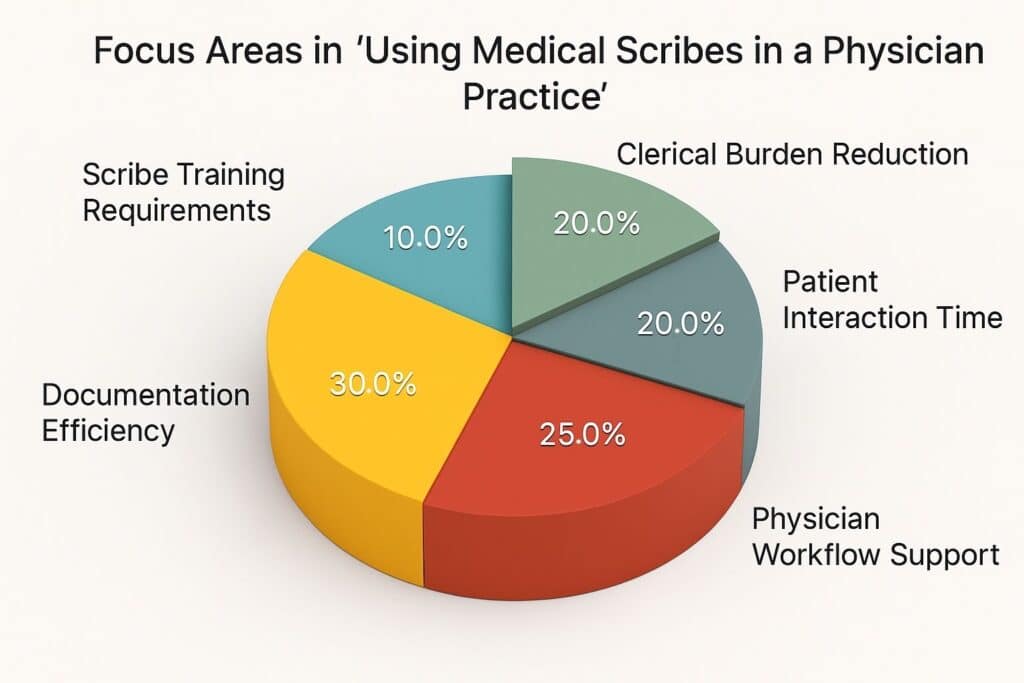Medical scribes play a crucial role in modern healthcare, acting as a bridge between physicians and the demanding clerical tasks that come with managing medical records. With the rise of documentation overload in healthcare, medical scribes have become indispensable in optimizing patient care and streamlining the operations of a medical facility. This piece provides an in-depth look at medical scribe duties and their impact on the healthcare field.
Medical Scribe Duties Explained
The core of medical scribe duties revolves around supporting physicians during patient visits by handling documentation and other office responsibilities efficiently. Similar to a medical transcriptionist, a medical scribe works alongside healthcare providers in a medical office, ensuring the smooth documentation of patient visits into electronic health records (EHR).

• Documenting a patient’s medical background, physical exams, and physician notes during a visit.
• Entering information into electronic health records, ensuring accuracy and completeness throughout.
• Managing additional clerical tasks, including drafting referral letters for specialists.
• Keeping track of patient documentation and ensuring it is updated for every visit.
• Enhancing patient flow by freeing up providers to focus on direct patient contact and patient care.
Thanks to their detailed understanding of medical scribing, medical scribes are instrumental in creating complete and clear documentation. This helps address the growing issue of documentation overload, ensuring physicians can dedicate more of their time to patient care.
Enhancing Workflow Through Real-Time Support
One of the most valuable aspects of having a medical scribe is their ability to provide real-time support during patient consultations. By transcribing notes and treatment plans as the visit unfolds, scribes reduce delays in documentation and eliminate the need for physicians to recall details after hours. This live assistance significantly enhances workflow efficiency, allowing healthcare providers to maintain thorough and accurate records while maximizing their time for direct patient contact.
Accurate Documentation of Patient History Matters
Capturing a complete and accurate patient history is essential for effective diagnosis and treatment planning. A Medical Scribe plays a crucial role in this process by recording detailed medical narratives in real time during patient encounters. Acting as a personal assistant to the physician, the scribe ensures that every relevant symptom, past condition, and medication detail is properly documented. With the support of professional medical scribe services, healthcare providers can rely on consistent, high-quality documentation that enhances patient care and reduces the administrative burden on clinical staff.
This pie chart illustrates the key focus areas in the article “Using Medical Scribes in a Physician Practice.” The largest portion, 30%, is dedicated to Documentation Efficiency, highlighting the primary role scribes play in managing electronic health records. Physician Workflow Support follows at 25%, showing scribes’ value in enhancing operational flow. Patient Interaction Time accounts for 20%, reflecting the benefit of allowing physicians more face time with patients. Clerical Burden Reduction (15%) and Scribe Training Requirements (10%) round out the chart, underscoring the administrative relief scribes provide and the importance of proper training.
Source: ncbi

What we provide
Virtual Medical Administrative Assistant
Medical Virtual Receptionist
Remote Medical Scribe
Medical Billing Virtual Asssistant
Executive VA & Virtual Office Manager
Virtual Dental Administrative Assistant
Dental Virtual Receptionist
Remote Dental Scribe
Dental Billing Virtual Assistant
Virtual Dental Executive Assistant
Patient Care Coordinator
Prior-Authorization
Provider Support
Telehealth Specialist
Telephone Triage
Remote Patient Monitoring
Overview of a Medical Scribe’s Job Description
When examining the role of a medical scribe, it is evident that their responsibilities are both varied and vital. Essentially, a medical scribe acts as a personal assistant to the physician, meticulously handling the documentation and clerical responsibilities required during patient visits.
A typical medical scribe job description includes tasks such as:

2. Facilitating the seamless flow of patients, a Medical Scribe assists with administrative tasks to minimize wait times.
3. Handling routine office tasks, such as filing documents, managing referral letters, and taking care of various office-related responsibilities.
4. Assisting in alleviating documentation overload, a Medical Scribe supports healthcare professionals with accurate and timely records.
5. Collaborating within the clinical setting, a Medical Scribe helps improve patient care and optimize the overall efficiency of the medical facility.
By fulfilling this comprehensive role, medical scribes work to improve operational functionality and enhance the quality of patient interactions during each patient visit.
Beyond Documentation: Personal Assistant Support and Other Clerical Duties
In addition to managing electronic health records, a medical scribe often functions as a personal assistant, directly supporting the physician with real-time documentation and various office duties. This role may also involve additional administrative responsibilities, such as organizing patient charts, coordinating appointment follow-ups, and communicating with external providers. These added responsibilities allow medical professionals to operate more efficiently and focus on delivering high-quality care without being burdened by non-clinical work.
The Importance of Medical Scribes in Patient Care
Medical scribe services are a vital part of healthcare teams, particularly in addressing the complexities of documentation overload. Their focus on handling the administrative and routine office responsibilities associated with patient care allows medical providers to focus on direct patient contact and diagnosing or treating patients.
By managing tasks like keeping patient documentation up to date and ensuring the use of effective software systems, medical scribes not only improve patient experiences but also contribute toward streamlining the overall performance of the medical office.
Equipped with strong communication skills and interpersonal skills, medical scribes act as key collaborators in healthcare. Their ability to work seamlessly with physicians and other medical staff ensures increased efficiency and enhanced patient care quality.
Discover Our Medical Scribe Services
If your healthcare organization struggles with documentation overload or needs support with clerical responsibilities, our professional medical scribe services can help. Experienced in medical scribing, our team ensures that your practice benefits from improved patient flow, accurate documentation, and reliable EHR management.
Contact us today to learn more about how our medical scribe services, combined with efficient medical record software, can optimize your facility for better patient care and operational efficiency.


